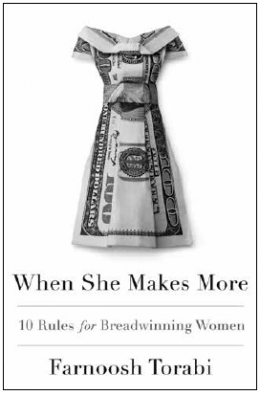Book Review - When She Makes More: 10 Rules For Breadwinning Women
 When She Makes More:
When She Makes More:
10 Rules For Breadwinning Women
Farnoosh Torabi, Hudson Street Press, C$28.95

Jane Austen would be delighted by the paradigm shift that has occurred in the modern world as women have become more educated than men. The median incomes of younger urban women now exceed those of younger urban men as the male-dominated manufacturing jobs have dramatically declined and female-dominated service jobs for educated women expand. It’s a brave new world, in which Mad Men now seems only slightly less dated than Pride and Prejudice. Farnoosh Torabi, a firstgeneration Iranian-American TV personality and finance celebrity, has a background of vintage stereotypes provided by the culture from which she came.
The book is really a conversation with the critical
voices of her mother and aunts as she grapples to
understand and provide advice on the emotional financial implications of changing gender-based
financial roles. It’s a slightly neurotic book since
who actually earns more in a partnership may be a total non-issue for many modern women.
Torabi, however, points out that men who are fully dependent on their partner’s income are far
more likely to cheat than those who aren’t. If their wives earn more than they do, then the divorce
rate goes up by 50%, and prescriptions for erectile dysfunction, anxiety and insomnia rise. In the US, about two-thirds of people polled still think that it’s very important that a man should be able to support a wife before marriage whereas only one-third think a woman should be able to do so. Old stereotypes die very hard. In the US, the number of single mothers has risen dramatically, especially among the lowest paid. Having a dependent and unfaithful man around is just too much of a drag, though the long-term impact on society of not having a father will be profound.
There’s no “one size fits all” way of addressing issues related to highly paid female breadwinners, but if it’s recognized by a couple to be a possible issue then this somewhat repetitive and
breathless book is packed with sensible advice.
The 10 Pieces Of Advice Are:
Face The Facts. Keeping a man at home who doesn’t contribute is going to cause resentment, and may encourage some men to remain immature and lazy Peter Pans.
Rewrite The Fairy Tale. You don’t have to believe in a world in which gender roles are agreed to be hard-wired into our DNA, it’s really more about values. Same-sex couples can make really great parents. The Scandinavians have shown the value of paternity as well as maternity leaves. We are way behind in family-centred social policies.
Level The Financial Playing Field. Agree on how the money will be managed, and who manages it, and agree on long-term and short- term priorities. Stay transparent online: both partners should have access to online accounts. She mentions some free websites where couples can share budgets and passwords (Passpack.com; Clipperz.com).
Hack The Hypotheticals. Figure out how you will deal with debt acquired before marriage, how you may deal with the financial responsibility for aging parents, and other events that may or will occur.
Cater To The Male Brain. The most clichéd but perhaps the most vital of her chapters isabout how breadwinning women deal with “the triumvirate of sex, money and power”. How do couples manage a successful and loving partnership in which the triumvirate does not win, in which both appreciate rather than criticize each other, and in which they overcome our confusing mixture of emotions, needs and wants? Some will be appalled by her advice to gently stroke the male ego.
Buy Yourself A Wife (and other tips to avoid domestic drudgery. Women who earn more than their men do more housework than their men. The chapter is packed with good advice for staying sane, naming interesting US-based websites on where to find grocery shoppers, dog walkers, cleaners, skilled freelancers, and the many others required to run a successful household. Canadian MoneySaver readers may see great job opportunities in this new economy. She has a neat suggestion to divvy up household tasks equitably, thus removing traditional gender-role based thinking.
Break The Glass Ceiling But Carry a Shield. This chapter contains great advice on balancing a high-pressured job with keeping things balanced on the home front, while also taking care of yourself. Compartmentalizing one’s life between work and home, and working successfully at both, may be the ideal balance. Don’t check Don’t check your emails on weekends, since it’s the surest route to burnout.
Grow A Thicker Skin. Plan with your spouse a few scripted responses to some of the thoughtless or hurtful comments you will inevitably encounter as a female breadwinner.
Planned Parenthood: From conception to college and beyond. This chapter contains crucial advice, set within the context of lack of support for maternity or paternity leave in the US, and the lack of a national childcare program in Canada.
Remember To Breathe. Good idea. This book will help.
We’re in the middle of a century-long process of transformation of gender roles but it will take to 2050 before there’s a truly equal gender division of tasks. We’ll need the resilience of strong families and an equitable society to deal with the numerous other global equity issues that will become more pressing by that time. Farnoosh Torabi has great ideas to help us get there, though I suspect she has an excellent income and no children of her own.
John Prescott coordinates the Guelph Share Club.


